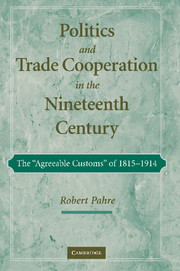Book contents
- Frontmatter
- Contents
- List of Figures
- List of Tables
- Preface
- POLITICS AND TRADE COOPERATION IN THE NINETEENTH CENTURY
- PART ONE COOPERATION AND VARIATION
- PART TWO DOMESTIC POLITICS AND TRADE POLICY
- PART THREE POLITICAL SUPPORT AND TRADE COOPERATION
- PART FOUR NORMS AND COOPERATION
- 10 The Most-Favored-Nation Norm
- 11 The Spread of the Trade Treaty Network
- 12 Clustering Negotiations in Time
- PART FIVE CONCLUSIONS
- References
- Index
10 - The Most-Favored-Nation Norm
Published online by Cambridge University Press: 08 December 2009
- Frontmatter
- Contents
- List of Figures
- List of Tables
- Preface
- POLITICS AND TRADE COOPERATION IN THE NINETEENTH CENTURY
- PART ONE COOPERATION AND VARIATION
- PART TWO DOMESTIC POLITICS AND TRADE POLICY
- PART THREE POLITICAL SUPPORT AND TRADE COOPERATION
- PART FOUR NORMS AND COOPERATION
- 10 The Most-Favored-Nation Norm
- 11 The Spread of the Trade Treaty Network
- 12 Clustering Negotiations in Time
- PART FIVE CONCLUSIONS
- References
- Index
Summary
“The most-favored-nation principle can in fact be interpreted as a convention designed to protect the third parties at the expense of whose industrial production the mutual benefits of preferential reciprocal tariff reduction are in part obtained.”
– Harry G. Johnson (1965: 279)Previous chapters have looked at the characteristics of individual states and at the two-country problem of cooperation. This part moves beyond dyads to look at the international system, especially the norms characterizing that system. I also introduce the concept of a regime, distinguishing it from both norms and behavior.
As in the rest of this book, I make a point of looking at variables that actually vary. This differs from many other theories' treatment of systemic-level characteristics, including norms. For example, Kenneth Waltz's (1979) Theory of International Politics examines only anarchic systems made up of nation-states, so that two of his three variables (the ordering principle and nature of the unit) do not vary; the third variable in Waltz's theory, the distribution of capabilities, does vary. Though differing from Waltz on almost every other dimension, Martha Finnemore's (1996) National Interests in International Society also does not study variation at the systemic level, but explicitly looks only at countries that share a given norm. Representing yet another tradition, Immanuel Wallerstein (1979, 1989) examines an international system that evolves and is internally differentiated, but his conceptual framework also does not allow central features of a world system, such as capitalism itself, to vary.
- Type
- Chapter
- Information
- Politics and Trade Cooperation in the Nineteenth CenturyThe 'Agreeable Customs' of 1815–1914, pp. 283 - 295Publisher: Cambridge University PressPrint publication year: 2007



